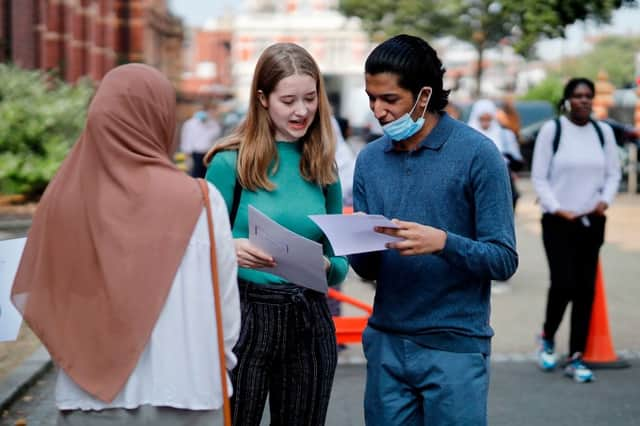Some pupils and teachers have called this year's A level results unfair - here's why


Nearly 40% of pupils have had their A level results downgraded after examinations were cancelled because of Covid-19.
Exam boards downgraded nearly two in five (39.1%) pupils’ grades in England, according to data from Ofqual – which amounts to around 280,000 entries being adjusted down after moderation.
Advertisement
Hide AdAdvertisement
Hide AdThe moderation of grades takes into account the previous performance of the child’s school and the child’s previous exam results.
Some have deemed the system unfair with school leaders “dismayed” at the “devastating impact” moderation could have on children’s futures.
How were exam results decided?
Exams were cancelled earlier this year due to the coronavirus pandemic, with Ofqual opting to use a statistical model to decide results.
School teachers provided predicted grades for each pupil and each subject.
Advertisement
Hide AdAdvertisement
Hide AdTeachers were also asked to rank pupils in order of how well they were expected to perform in their examinations.
Exam regulator Ofqual moderated these grades.The moderation of grades took into account the previous performance of the child’s school and the child’s previous exam results.
Why are some calling the grading process unfair?
A survey of sixth form college heads in England received several responses claiming that the results awarded to pupils were the worst in their history.
Some have argued that private schools have benefited from the system, while state schools in deprived areas suffered disproportionately. A grades at private schools were up by 4.7% compared to 2019, compared to just 0.3% at Sixth form colleges.
Advertisement
Hide AdAdvertisement
Hide AdAn A* pupil at a Liverpool comprehensive school with an offer from a top university told the Guardian that she feared the process was benefiting the rich.
She said: “I feel like this is a system that’s benefiting the rich, and no matter how hard you work you’ll be brought down.”
Speaking about the A level results, Geoff Barton, general secretary of the Association of School and College Leaders (ASCL), said: “While there has been an overall increase in top grades, we are very concerned that this disguises a great deal of volatility among the results at school and student level.
“We have received heartbreaking feedback from school leaders about grades being pulled down in a way that they feel to be utterly unfair and unfathomable. They are extremely concerned about the detrimental impact on their students.”
Advertisement
Hide AdAdvertisement
Hide AdHe added that school leaders are “dismayed” that the statistical model used to standardise grades has had a “devastating impact.
Mr Barton said: “We are now calling on the government and the exam regulator Ofqual to review the situation as a matter of urgency, and we would warn them against simply digging in their heels, and insisting all is well.”
What has the government said?
Education Secretary Gavin Williamson, defended the grading.
Writing in the Telegraph, he argued that the absence of moderation in England would see students lose out and “devalue the results for the class of 2020”.
Advertisement
Hide AdAdvertisement
Hide AdAsked if he was prepared to change the system again amid threats of legal action from parents, Mr Williamson told Times Radio: “We’re not going to be changing this system again.
“We believe that we’ve put in place – in terms of the triple lock, in terms of the actions we’ve taken – a system that is able to put its arm round those youngsters where there has been a grade that has been unfair on them and is able to put that right.”
He also claimed that pupils from the most disadvantaged backgrounds would have been at “high risk” of losing out compared with their more middle-class counterparts if exams had been delayed rather than cancelled.
Mr Williamson was asked if he regretted not pushing for exams to be delayed until June.
Advertisement
Hide AdAdvertisement
Hide AdHe replied: “If we’d been in a situation where we tried to delay the exams – and this is what happened in Ireland – what became apparent is that children from the most disadvantaged backgrounds, who maybe hadn’t had the same level of support and help, would have been at a maybe high risk of not either turning up to those exams or not having had the same level of support in the run-up to those exams as children from more middle-class backgrounds.”
Can students now appeal?
Pupils can challenge the result of a GCSE, AS Level or A level qualification if:
- their school or college made a mistake when sending the grading information
- their school or college thinks the result is wrong
- they have evidence of wrongdoing, including discrimination
Advertisement
Hide AdAdvertisement
Hide AdWhen a review is requested the mark may be changed if the reviewer thinks it’s wrong, although it may be higher or lower than the original grade. You or your school may have to pay if the mark is not changed.
If you are unhappy with the decision of the review, an appeal can then be made to Ofqual. This must be made within 15 days of getting the result of a review. The deadline to submit a review for GCSE and A and AS levels is 17 September 2020.
Further information on how to submit an appeal can be found in the Ofqual guide online.